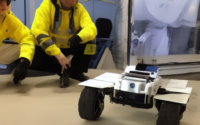Advances in Personal Health Monitoring Devices
Advances in Personal Health Monitoring Devices
Introduction
In recent years, there have been remarkable advancements in personal health monitoring devices. These technological innovations have revolutionized the way individuals track and manage their health. From wearable fitness trackers to smartwatches with built-in health sensors, these devices offer real-time monitoring and comprehensive data analysis. This article explores the latest breakthroughs in personal health monitoring technology and their impact on improving overall well-being.
1. Wearable Fitness Trackers
Wearable fitness trackers have gained immense popularity due to their ability to monitor various aspects of physical activity. These devices typically feature an accelerometer to track steps, distance, and calories burned throughout the day. Additionally, many advanced models now incorporate heart rate monitors, GPS tracking, and sleep tracking functionality. By wearing a fitness tracker, individuals can gain insights into their daily activity levels, set goals, and measure progress.
2. Smartwatches with Health Sensors
Smartwatches have evolved beyond being just a stylish accessory for your wrist. The latest smartwatches come equipped with an array of health sensors, making them comprehensive personal health monitoring devices. These sensors can measure heart rate, blood pressure, oxygen saturation levels, and even detect irregular heart rhythms. With continuous monitoring, individuals can receive alerts and insights into their health, providing valuable information for early detection of potential medical conditions.
3. Blood Glucose Monitors
For individuals with diabetes, managing blood glucose levels is crucial. Traditional finger-prick testing can be a cumbersome and invasive process. However, recent advancements in personal health monitoring devices have introduced non-invasive blood glucose monitors. These innovative devices use optical sensors to measure blood sugar levels without the need for painful finger pricks. With simple and painless monitoring, individuals with diabetes can more easily manage their condition and make informed decisions about their diet and medication.
4. ECG Devices for Home Monitoring
Electrocardiogram (ECG) devices are now available for home monitoring, allowing individuals to assess their heart health beyond clinical settings. These portable ECG devices are compact and user-friendly, enabling users to record their heart rhythm and detect any abnormalities. With the help of smartphone apps, the recorded data can be analyzed and shared with healthcare professionals for further evaluation. ECG devices for home monitoring offer a convenient and cost-effective method of monitoring heart health.
5. Sleep Tracking Devices
Sleep plays a vital role in maintaining overall health and well-being. Sleep tracking devices have emerged as a popular tool for monitoring sleep patterns and assessing sleep quality. These devices utilize accelerometers and heart rate monitors to gather data on sleep duration, sleep stages, and disturbances during the night. By analyzing this information, individuals can identify any potential sleep issues and take necessary steps to improve sleep hygiene, ultimately leading to improved overall health.
6. Smart Scales
Smart scales have revolutionized the way individuals track their weight and body composition. These scales not only measure weight but also provide additional metrics such as body fat percentage, muscle mass, and bone density. With the help of smartphone apps, individuals can set goals, track progress, and gain a deeper understanding of their body composition changes over time. Smart scales provide comprehensive insights into physical health, helping individuals make informed decisions about their fitness and nutrition.
Conclusion
Advances in personal health monitoring devices have empowered individuals to take control of their health like never before. These devices offer real-time monitoring, comprehensive data analysis, and actionable insights. From tracking physical activity to assessing sleep quality and monitoring vital signs, these technological innovations provide individuals with valuable information to make informed decisions about their well-being. As technology continues to advance, personal health monitoring devices are expected to become even more sophisticated, revolutionizing the healthcare industry and improving overall health outcomes.


